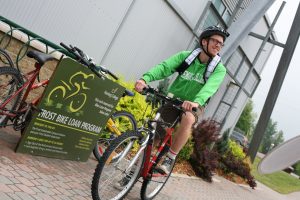Ontario colleges leading the fight to tackle climate change: report

Peterborough, ON (Oct. 12, 2016) – Ontario’s colleges are playing a leading role in Canada’s efforts to tackle climate change, says a newly released report.
The report, Moving to Net Zero: Colleges Leading the Way, highlights the 24 colleges’ achievements in everything from leading-edge research that promotes energy efficiency to the development of programs that prepare increasing numbers of graduates for careers in areas such as sustainable building construction and environmental technology.
“Fleming College has been a leader in environmental education for close to 50 years,” said Trish O’Connor, Lead – Office of Sustainability. “This, along with the achievements we have made on our path to become a more sustainable institution, clearly illustrates our concerted efforts to improve the health of the planet. It is a priority for us at Fleming.”
The report documents achievements in five areas: research, community leadership, college programs, transportation and campus upgrades. The examples in the report confirm that all 24 colleges are playing an active part in the effort to reduce the province’s carbon footprint.
Locally, Fleming has shown leadership in all five areas:
- Research – Fleming’s Centre for Alternative Wastewater Treatment promotes innovative and sustainable forms of water and wastewater treatment technology through applied research and education.
- Community Leadership – Fleming was the first Canadian post-secondary institution to ban the sale of bottled water on campus, reducing its contribution to the amount of waste from disposable plastic bottles, and the energy to produce and sell water. Fleming’s leadership in sustainability was recognized when it was recently awarded a STARS (Sustainability Tracking Assessment Rating System) Silver rating from the Association for the Advancement of Sustainability in Higher Education. Fleming’s Office of Sustainability has also set and achieved sustainability targets, via a five year sustainability plan, that range from reducing energy and water usage to increasing consumption of local food by creating campus community gardens, a farmers’ market, and a local food box program supplied by the Sustainable Agriculture program.
- College Programs – Fleming’s School of Environmental and Natural Resource Sciences has more than 30 full-time programs that range from Ecological Restoration to Urban Forestry to Sustainable Agriculture. The School has more alumni working in the environmental and natural resources fields than any other college in Canada.
- Transportation – Frost Campus has a bike sharing program while all Sutherland Campus students receive transit passes. The College has introduced an intercampus shuttle between Frost and Sutherland for students and staff, as well as video conferencing technology to reduce need for inter-campus travel.
- Campus Upgrades – The Kawartha Trades and Technology Centre, which opened in 2014, was built to a LEED gold standard with passive solar, a rain water catchment system, and electric vehicle charge stations. At Frost Campus, the Environmental Technology Wing features geothermal heating and cooling, a green roof, and wind power. The College continues to work to renew aging campus facilities with a concerted effort to improve energy efficiency.
The findings in the report include:
- Ontario colleges offer more than 300 programs that prepare graduates to work in sectors that directly impact emissions reductions, conservation and renewable energy.
- In 2015-16, more than 20,000 students were enrolled in programs that prepare them for careers that address climate change – an increase of more than 20 per cent over the past five years.
- Millions of dollars have been invested in retrofit programs and other upgrades at campuses across the province. The retrofitting projects have included weatherization initiatives, energy and greenhouse gas audits, the installation of wind turbines and solar panels, and the integration of new designs that include green roofs and pollinator gardens.
“While we’re proud of our successes, we also know there is more to do,” said O’Connor. “We will continue to work to implement the goals set out in our Five Year Sustainability Plan and we will do what we can to reduce emissions and produce qualified graduates that are contributing to a net zero economy.”
The full report is available here.
About Fleming College
Located in the heart of Central Ontario, Fleming College has campus locations in Peterborough, Lindsay, Cobourg and Haliburton. Named for famous Canadian inventor and engineer Sir Sandford Fleming, the college features more than 100 full-time programs in Arts and Heritage, Business, Environmental and Natural Resource Sciences, General Arts and Sciences, Health and Wellness, Justice and Community Development, Skilled Trades and Technology, and Continuing Education. Fleming College has more than 5,800 full-time and 10,000 part-time students, and 71,000 alumni.
-30-
Media, for more information please contact:
Laura Copeland, Communications Officer
Fleming College
laura.copeland@flemingcollege.ca
705.749.5530 x 1370